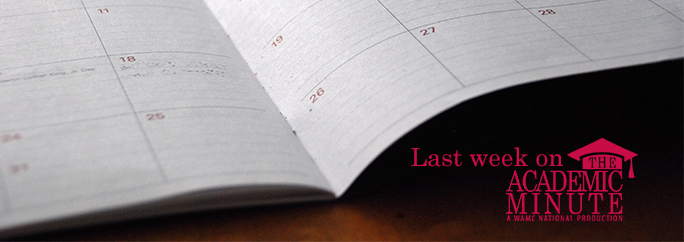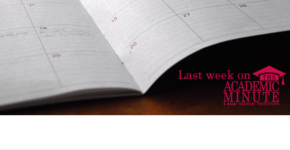
The Academic Minute from 02.07 – 02.11
Monday, February 7th
John Lefebvre – Wofford College
Fostering Resilience Among College Students
John Lefebvre is a professor of psychology at Wofford College in Spartanburg, South Carolina. Trained as a clinical psychologist, his teaching and research focus on topics related to physical and mental health. Lefebvre teaches courses in abnormal psychology, personality, health psychology and clinical psychology. In 2010, he was awarded Wofford’s Roger Milliken Award for Excellence in Teaching Science. Lefebvre’s research has concentrated on the experience of pain, especially the influence of personality, worry, catastrophizing and memory. Recently, his research has focused on improving student well-being through a variety of approaches. Lefebvre also has served as a leader on campus, directing the college’s implementation of its strategic plan. He’s also a past chair of the Wofford Department of Psychology. Lefebvre has been published.
Tuesday, February 8th
Frederick Becker – York College of Pennsylvania
Attracting Employees to the Restaurant Business after COVID-19
Frederick Becker is an associate professor and Chair of the Hospitality Management Department at York College. He holds degrees from Paul Smith’s College, the University of Denver, and Plattsburgh State University. In 2012 he completed his PhD at Pennsylvania State University, majoring in Hospitality Management. His dissertation topic was “The impact of fun in the workplace on experienced fun, work engagement, constituent attachment, and turnover among entry-level service employees.” In addition to teaching courses in hospitality management, he has been responsible for a number of administrative assignments including Hotel Saranac faculty coordinator at Paul Smith’s College, Dean of Business and Hospitality at Penn College, and program coordinator/department chair at York College. Dr. Becker has been actively involved in industry organizations at the local, state, and national levels, including the Williamsport/Lycoming Chamber of Commerce, the New York State Hospitality and Tourism Association, the Pennsylvania Restaurant and Lodging Association, the Middle States Commission on Higher Education, and the Council on Hotel, Restaurant, and Institutional Education. As an educator he is committed to experiential education, engaging classroom activities, and program accountability through accreditation. He enjoys hiking, biking, boating, golf, food, wine, and travel.
Wednesday, February 9th
G. Samantha Rosenthal – Roanoke College
Transgender History in Forgotten Places
Gregory Samantha Rosenthal (she/they) is Associate Professor of History and Coordinator of the Public History Concentration at Roanoke College in Salem, Virginia. She is the author of two books, Living Queer History: Remembrance and Belonging in a Southern City and Beyond Hawaiʻi: Native Labor in the Pacific World. They are co-founder of the Southwest Virginia LGBTQ+ History Project, a nationally recognized queer public history initiative. Her work has received recognition from the National Council on Public History, the Oral History Association, the Committee on LGBT History, the American Society for Environmental History, and the Working Class Studies Association.
Thursday, February 10th
Miriamne Krummel – University of Dayton
The Empire of Time
Miriamne Ara Krummel is a professor of English and medieval studies in the Department of English, University of Dayton. She holds a B.A. in English from University of Connecticut; an M.A. in English from Hunter College, CUNY; and a Ph.D. in English from Lehigh University. Her current research studies medieval temporality as expressed in Middle English, Hebrew, and Latin texts; Krummel is especially concerned with the relationship between Christian and Jewish time and the space afforded Jewish temporality in Latin Christendom. This research will be published in The Medieval Postcolonial Jew, In and Out of Time by University of Michigan Press. Her second book, co-edited with Tison Pugh, Jews in Medieval England: Teaching Representations of the Other (Palgrave Macmillan), features chapters that discuss the teaching of texts by and also about Jews; Krummel’s first book, Crafting Jewishness in Medieval England: Legally Absent, Virtually Present (Palgrave Macmillan), examines the role performed by Jewishness in the making of an English medieval nation. Dr. Krummel has been published in the journals Exemplaria, Shofar, postmedieval, and TSLL, as well as edited volumes about medieval literature.
Friday, February 11th
Rich Pellegrin – University of Florida
Improvisation is the Future in an A.I. Dominated World
Rich Pellegrin is Assistant Professor of Music Theory at the University of Florida and Affiliate Assistant Professor in the Center for Arts, Migration, and Entrepreneurship. His primary area of research specialization is the analysis of jazz. His work has been published in Jazz Perspectives, Engaging Students, the Journal of Schenkerian Studies, The Conversation, and in volumes by Cambridge Scholars Publishing and KFU Publishing House. Pellegrin recently served as Guest Editor of a special issue of Jazz Perspectives devoted to John Coltrane.
As a jazz pianist, composer, and bandleader, he has released four albums on Origin Records’ OA2 label. His recent record Down was reviewed in Downbeat Magazine, which described “moments of absolute bliss” and wrote, “Pellegrin does as the great pianists do, supplying encouragement and graceful touches in the background, before diving forward to take solos that are by turns florid and cracked, balletic and modern.” He is currently working on a multi-volume solo project.
